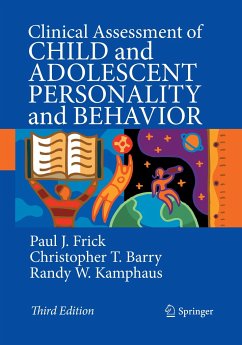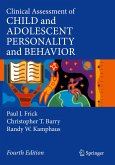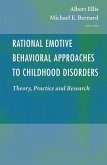Psychologists offer an increasing variety of services to the public. Among these services, psychological assessment of personality and behavior continues to be a central activity. One main reason is that other mental health professionals often do not possess a high level of competence in this area. And when dealing with children and adolescents, psychological assessment seems to take on an even greater role. Therefore, it follows that comprehensive graduate-level instruction in assessment should be a high priority for educators of psychologists who will work with these youth.
This textbook is organized into three sections, consistent with the authors' approach to teaching. Part I provides students with the psychological knowledge base necessary for modern assessment practice, including historical perspectives, measurement science, child psychopathology, ethical, legal, and cultural issues, and the basics of beginning the assessment process. Part II gives students a broad review of the specific assessment methods used by psychologists, accompanied by specific advice regarding the usage and strengths and weaknesses of each method. In Part III, we help students perform some of the most sophisticated of assessment practices: integrating and communicating assessment results and infusing assessment practice with knowledge of child development and psychopathology to assess some of the most common types of behavioral and emotional disorders in youth.
A text focusing on assessment practices must be updated every four to six years to keep pace with advances in test development. For example, several of the major tests reviewed in the text, such as the Behavioral Assessment System for Children and the Child Behavior Checklist, have undergone major revisions since the publication of the last edition making the current content outdated. Further, another major test, the Conners' Rating Scales, is undergoing substantial revisions that should be completedbefore publication of the next edition. Finally, the evidence for the validity of the tests and the recommendations for their appropriate use evolve as research accumulates and requires frequent updating to remain current. For example, there was a special issue of the Journal of Clinical Child and Adolescent Psychology published focusing on evidenced-based assessment of the major forms of childhood psychopathology that will need to be integrated into the chapters in Part 3.
This latter point reflects an important trend in the field that should influence the marketing of the book. That is, there are several initiatives being started in all of the major areas of applied psychology (e.g., school, clinical, and counseling) to promote evidenced-based assessment practices. These initiatives have all emphasized the need to enhance the training of graduate students in this approach to assessment. This has been the orientation of this textbook from its first edition: that is, Clinical Assessment of Child and Adolescent Personality and Behavior has focused on using research to guide all recommendations for practice. The ability of the textbook to meet this training need should be an important focus of marketing the book to training programs across all areas of applied psychology.
This textbook is organized into three sections, consistent with the authors' approach to teaching. Part I provides students with the psychological knowledge base necessary for modern assessment practice, including historical perspectives, measurement science, child psychopathology, ethical, legal, and cultural issues, and the basics of beginning the assessment process. Part II gives students a broad review of the specific assessment methods used by psychologists, accompanied by specific advice regarding the usage and strengths and weaknesses of each method. In Part III, we help students perform some of the most sophisticated of assessment practices: integrating and communicating assessment results and infusing assessment practice with knowledge of child development and psychopathology to assess some of the most common types of behavioral and emotional disorders in youth.
A text focusing on assessment practices must be updated every four to six years to keep pace with advances in test development. For example, several of the major tests reviewed in the text, such as the Behavioral Assessment System for Children and the Child Behavior Checklist, have undergone major revisions since the publication of the last edition making the current content outdated. Further, another major test, the Conners' Rating Scales, is undergoing substantial revisions that should be completedbefore publication of the next edition. Finally, the evidence for the validity of the tests and the recommendations for their appropriate use evolve as research accumulates and requires frequent updating to remain current. For example, there was a special issue of the Journal of Clinical Child and Adolescent Psychology published focusing on evidenced-based assessment of the major forms of childhood psychopathology that will need to be integrated into the chapters in Part 3.
This latter point reflects an important trend in the field that should influence the marketing of the book. That is, there are several initiatives being started in all of the major areas of applied psychology (e.g., school, clinical, and counseling) to promote evidenced-based assessment practices. These initiatives have all emphasized the need to enhance the training of graduate students in this approach to assessment. This has been the orientation of this textbook from its first edition: that is, Clinical Assessment of Child and Adolescent Personality and Behavior has focused on using research to guide all recommendations for practice. The ability of the textbook to meet this training need should be an important focus of marketing the book to training programs across all areas of applied psychology.








